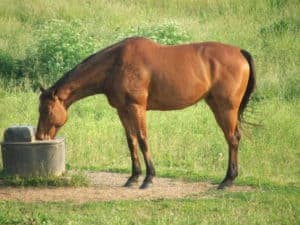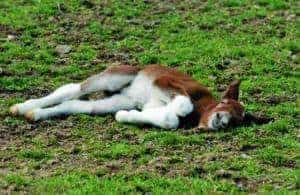
Grazing Muzzles’ Efficacy at Reducing Pasture Intake
Grazing muzzles can be effective at reducing pasture intake, sometimes reducing intake by as much as 85%.


Grazing muzzles can be effective at reducing pasture intake, sometimes reducing intake by as much as 85%.

A team of researchers recently revealed that horses tend to prefer water with neutral pH levels than low pH.
A newly launched campaign in Vermont hopes to assist owners affected by the storm care for their horses.
A 6-year-old Standardbred mare from Fleming County, Kentucky, tested positive for West Nile virus Sept. 2.

Two additional California horses tested positive for neurologic equine herpesvirus-1 (EHV-1) on Aug. 24.

Peripartum colic is a common but sometimes life-threatening complication often seen in broodmares.

Days after Hurricane Irene battered the East Coast, authorities are evaluating the damage left behind.
The 2010 Canadian Equine Industry Profile Study results reveal an equine industry worth $19 billion annually.
A tenth horse in New South Wales has tested positive for hendra virus, bringing the national total to 21.
At press time no equine fatalities had been reported, but many areas are still evaluating the damage.

Special considerations should be made when evaluating a colicky foal as opposed to an adult horse.

Forty horses from one Clarksville, Ark., farm have died or been euthanized after testing positive for EIA.
A 15-year-old Oldenburg mare from Sonoma County tested positive for neurologic EHV-1 on Aug. 23.
Twenty-one horses at a Lebanon racetrack were euthanized after two of them tested positive for glanders.
A Queensland horse was confirmed positive for hendra virus today, bringing the national total to 20 cases.

What are the most important things to consider and employ when dealing with a horse affected by chronic colic?
Stay on top of the most recent Horse Health news with